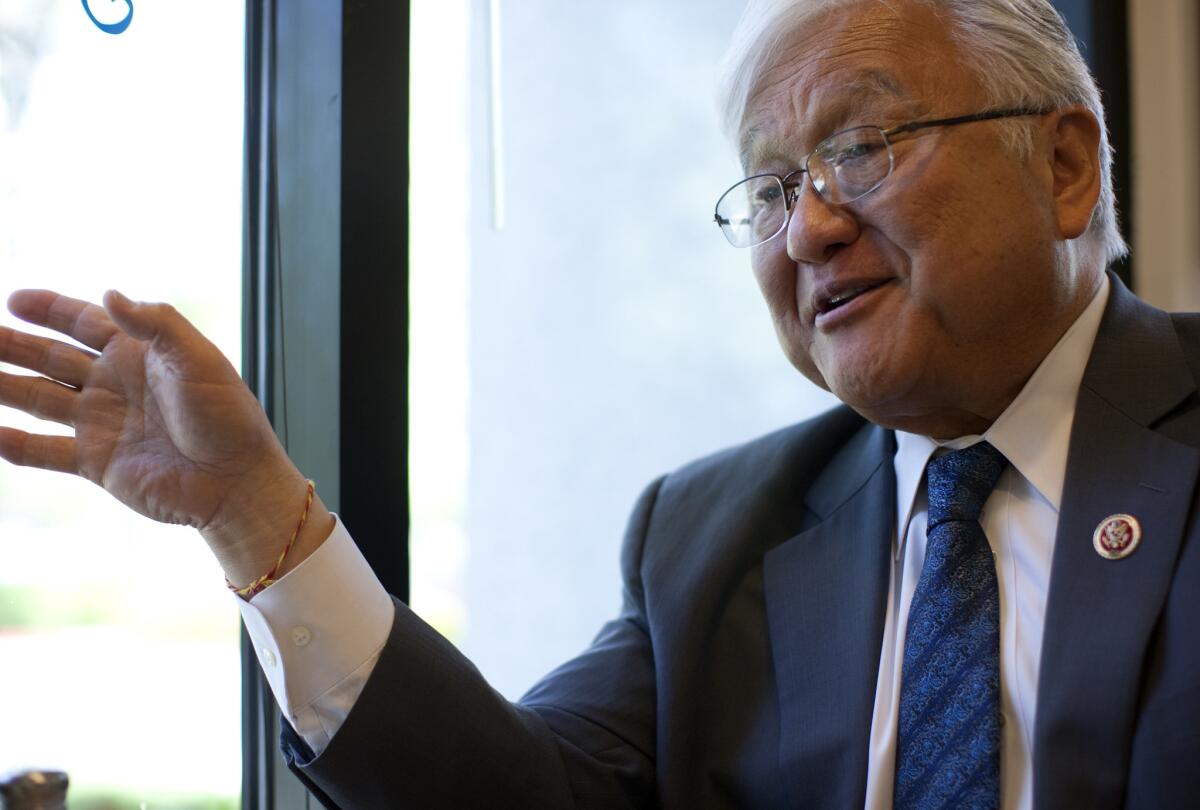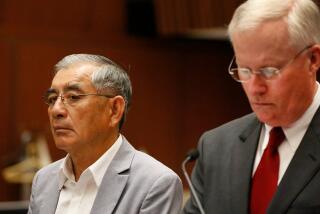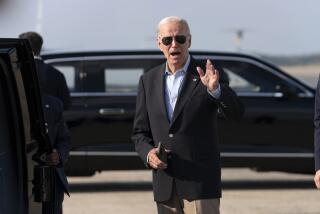Report finds ‘reason to believe’ Rep. Honda’s campaign blurred ethics lines

A congressional panel found that it’s likely Rep. Mike Honda (D-San Jose), shown, and his staff used government resources for his reelection campaign, but has not decided whether he should face any penalties.
Reporting from Washington — A nonpartisan congressional investigation found “substantial reason to believe” that Rep. Mike Honda and his congressional staff used taxpayer resources to benefit his campaign, according to a report released Thursday afternoon.
But the committee made up of Honda’s colleagues that reviews such reports has not yet determined whether Honda, a San Jose Democrat, should face any penalties, saying in a statement Thursday from Rep. Charles Dent (R-Pa.) and Linda Sanchez (D-Whittier), the chairman and ranking Democrat, that it would take more time to review the initial investigative report.
Honda, in a statement, said the report “draws no conclusions” and that “the issues addressed in the report simply do not represent congressional ethics violations.”
Honda has been facing scrutiny over the issue for nearly a year, dating back to his costly and contentious reelection campaign against Ro Khanna, a fellow Democrat who is once again challenging him.
Allies of Khanna filed the complaint after a September 2014 report in San Jose Inside that revealed emails between Honda’s chief of staff, Jennifer Van der Heide, and Lamar Heystek, who was serving as Honda’s campaign manager when the emails were exchanged. The email discussions related to potential donors who Honda’s office might invite to an official State Department roundtable discussion that he co-hosted in 2013.
Thursday marked the first time that official details of the initial investigation, conducted by the nonpartisan Office of Congressional Ethics, have been made public. The 41-page report, completed in June, depicts an office with blurry lines between official and campaign duties. The report also said “there is substantial reason to believe that Rep. Honda improperly tied official events” to potential donations for his campaign.
Members of Honda’s congressional staff told investigators that there was an expectation that they would help with campaign work.
One unnamed former staff member told investigators that she could have declined, but “I think that would have probably meant, though, that I needed to find a new job.”
The report says that Honda’s staff ordered several members of the office to read a book written by Khanna, held regular “coffee breaks” to discuss campaign business, and that a former campaign manager gave a presentation about the campaign during a 2013 office retreat, in which he suggested using official office events to raise money for the campaign.
Notes from a 2012 retreat refer to a fundraising effort that “will likely be transactional -- i.e. help me with the visa for my grandma,” the report stated.
The report details a 2013 incident in which Honda’s office helped “someone associated with the San Jose Sharks professional hockey team” with a constituent issue and then passed on the constituent’s personal contact information to the campaign, “suggesting that the campaign seek contributions from the individuals involved.”
Honda’s office, in a news release, asked for patience and called the issues raised in the report “largely clerical in nature, involving sloppiness by staff relating to administrative rules.”
“I’m rightfully proud of my staff for being extraordinarily hard-working public servants, dedicated to constituent service, but they are not flawless. As a result of the OCE investigation, I have instituted one of the most aggressive policies in Congress on the use of staff,” Honda said in the statement. “Even though the House Rules permit congressional staff to volunteer on their member’s campaign, I’ve erected a firewall in my office prohibiting this activity. I know of no other congressional office with such a strict policy.”
Honda’s attorneys, in a detailed response to the congressional ethics committee, said “the report addresses actions which either do not violate applicable ethics rules or, at worst, present narrow concerns. Most importantly, the report clearly establishes that Rep. Honda acted ethically and had no participation in, knowledge of, or reason to know about any of the allegations at issue.”
The July 8 legal response -- written by Andrew Herman on behalf of Honda and Stanley Brand on behalf of Van der Heide and another former staff member -- says that the investigative report ignored explicit reminders issued during the retreats to act ethically.
“The report also focuses on discrete discussions during the ‘coffee breaks’ and retreats that were either permissible or inconsequential,” the response states. “Further, no subsequent inappropriate conduct by either office or campaign staff occurred as a result of these tangential conversations.”
Twitter: @noahbierman
More to Read
Sign up for Essential California
The most important California stories and recommendations in your inbox every morning.
You may occasionally receive promotional content from the Los Angeles Times.











